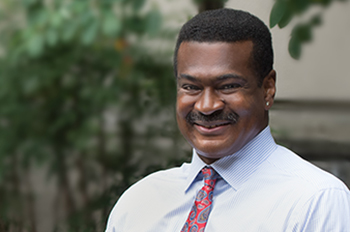By Angelo McClain, PhD, LICSW

At the intersection of 38th Street and Chicago Avenue in Minneapolis, hallowed ground also known as George Floyd Square, a raised-fist sculpture defiantly proclaims: Black Lives Matter!
On March 29, Derek Chauvin’s trial in the death of George Floyd began. We know the trial is about much more than a white former police officer being tried for killing a Black man. It’s a case that serves as a referendum on racial change in the United States as much as it’s about Chauvin’s guilt or innocence.
Chauvin’s murderous actions on Memorial Day 2020 sparked a summer of nationwide protests and forced a national reckoning on issues of race, policing and social justice. Will we finally see a white officer held accountable for killing a Black person? A conviction should be considered a bare minimum and a reflection that the system performed as it should. An acquittal would be a humiliating slap in the face. A proper verdict also can help curb the spread of white supremacy and possibly accelerate the march toward a more democratized nation.
We must understand that with the anticipation of the trial’s outcome comes anxiety—lots of anxiety—not only about the trial, but also about our country’s approach to justice. After a year of protests and fighting the coronavirus, the extensive media coverage of Chauvin’s trial is reopening deep wounds for many Black Americans. Researchers have found that stress associated with experiencing racism can have long-lasting physical and mental health effects—conditions like depression, anxiety, and overall poor health outcomes.
Chronic experiences of frequent discrimination create a sustained level of stress and stress hormones, and can damage the physiological systems that regulate the body’s stress response. This can lead to physical conditions like high blood pressure and heart disease for people of color. Racism is a mental health issue because racism causes trauma, and trauma is correlated with mental illnesses. The broad takeaway here is that racial discrimination can lead to health problems that detract from a person’s quality of life.
We are living in times where people of color are afraid for their families and themselves, which is a violation of human rights. Every person deserves to live with a sense of dignity, worth and safety. As leaders, social workers must call for concrete, measurable responses to hate and racism—solutions like the No Hate Act filed by Democratic congressional members, which would improve hate crime reporting, expand resources for victims, and strengthen federal laws that combat hate speech and attacks
The stakes are high for the Chauvin trial. It marks a seminal moment for America — not only regarding systemic racism, policing and our justice system, but also how it impacts our collective mental health.
Contact Angelo McClain at naswceo@socialworkers.org